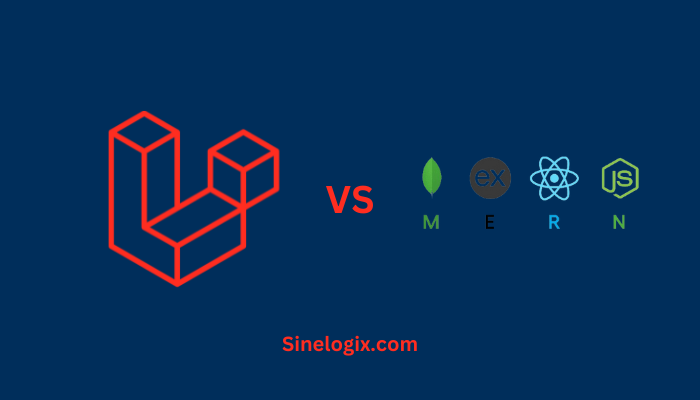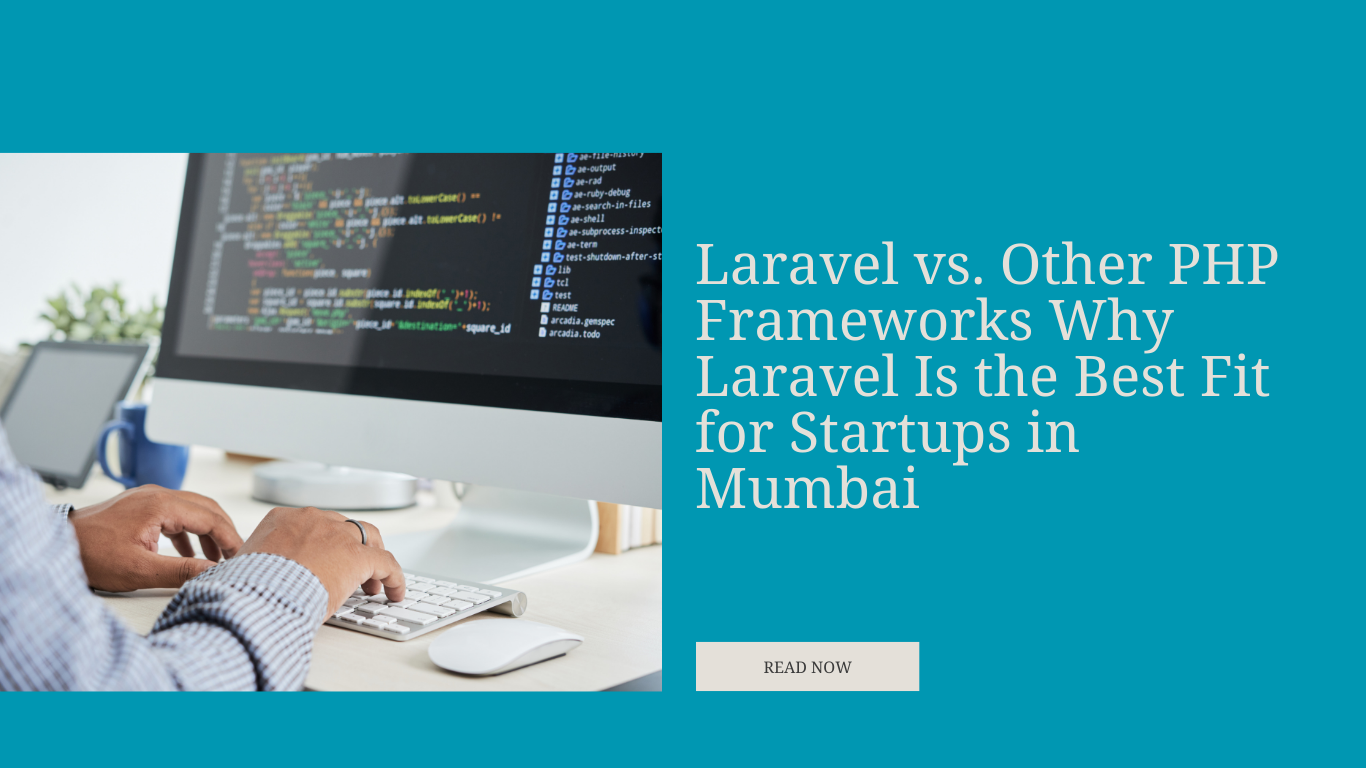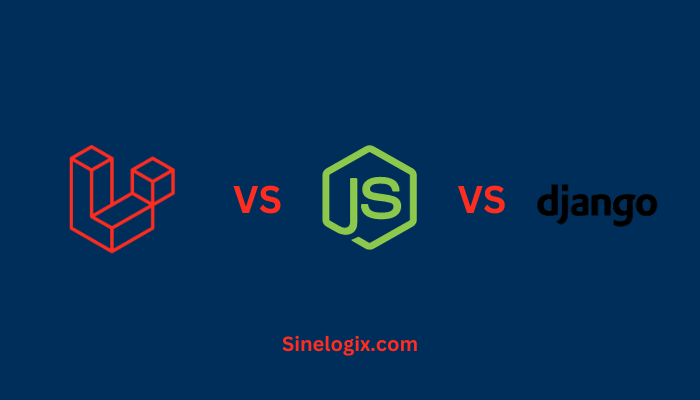Laravel and the MERN stack represent two distinct approaches to web development, each with its own strengths and use cases. Laravel, a PHP-based full-stack framework, competes with the MERN stack, a collection of technologies (MongoDB, Express.js, React, Node.js) that together enable the development of modern web applications.
In this exploration, we’ll delve into various aspects of Laravel and the MERN stack, shedding light on their features, performance, and suitability for different project scenarios.
Overview of Laravel and MERN Stack
Laravel: Laravel is a feature-rich PHP framework known for its elegant syntax and developer-friendly environment. Following the MVC architectural pattern, Laravel offers tools for routing, templating (Blade engine), and ORM (Eloquent) for database interactions. It boasts a robust ecosystem and supports rapid development, making it a popular choice for a wide range of applications.
MERN Stack: The MERN stack comprises four key technologies: MongoDB (a NoSQL database), Express.js (a web application framework for Node.js), React (a JavaScript library for building user interfaces), and Node.js (a JavaScript runtime for server-side development). Together, these technologies enable the creation of dynamic and scalable web applications. MERN’s strength lies in its JavaScript-centric approach, fostering seamless communication between the frontend and backend.
Language and Ecosystem
Laravel: Built on PHP, Laravel leverages the extensive PHP ecosystem. Composer, the PHP package manager, enhances Laravel’s capabilities by providing access to a wealth of third-party libraries and tools. Laravel’s ecosystem includes the Artisan command-line tool for automating tasks, contributing to a streamlined development workflow.
MERN Stack: The MERN stack revolves around JavaScript, with Node.js enabling server-side development. npm (Node Package Manager) serves as the package manager for the JavaScript ecosystem, allowing developers to easily integrate libraries and tools into their projects. The unified use of JavaScript across the stack promotes code reusability and consistency.
Architecture and Design Philosophy
Laravel: Laravel adheres to the MVC architectural pattern, emphasizing a clean separation of concerns. The framework follows an opinionated approach, providing conventions that enhance developer productivity. Laravel’s design philosophy prioritizes expressive syntax, developer happiness, and the creation of elegant and maintainable code.
MERN Stack: The MERN stack’s architecture is more flexible, with each technology serving a specific purpose. Express.js provides a minimalist framework for building web applications, and React focuses on creating dynamic and reusable UI components. The stack’s design philosophy promotes modularity, allowing developers to choose tools that best fit their project requirements.
Learning Curve and Documentation
Laravel: Laravel is known for its developer-friendly syntax, making it accessible for PHP developers. Comprehensive documentation, guides, and tutorials facilitate the learning process. Resources like Laracasts provide video tutorials, contributing to a supportive learning environment.
MERN Stack: The MERN stack, being JavaScript-centric, requires developers to have proficiency in JavaScript and its ecosystem. Learning resources for each MERN technology (MongoDB, Express.js, React, Node.js) are abundant, but the stack’s flexibility may lead to a steeper learning curve for beginners.
Community and Support
Laravel: Laravel boasts a large and active community, contributing to its growth and improvement. Forums, third-party packages, and regular updates showcase the community’s engagement. Laravel’s popularity ensures ongoing support and a wealth of resources for developers.
MERN Stack: The MERN stack benefits from the collective strength of the JavaScript community. The popularity of individual technologies like React and Node.js ensures continuous development and support. While the MERN stack doesn’t have a centralized community, the widespread use of its components fosters a supportive ecosystem.
Performance and Scalability
Laravel: Laravel offers good performance for PHP applications and is suitable for various project sizes. Its scalability is enhanced by features like caching, queuing, and optimized database queries. Laravel Horizon assists in managing scalable applications efficiently.
MERN Stack: The MERN stack, leveraging Node.js for server-side development, is known for its scalability. Node.js’s non-blocking, event-driven architecture allows for handling a large number of concurrent connections. MongoDB’s horizontal scalability supports the growth of data-intensive applications.
Middleware and Request Handling
Laravel: Laravel’s middleware system provides a flexible mechanism for filtering HTTP requests. Middleware can perform tasks like authentication, logging, and modifying incoming requests, enhancing Laravel’s ability to handle various aspects of request processing.
MERN Stack: Express.js, part of the MERN stack, uses middleware for handling HTTP requests. Middleware functions can execute code before reaching the route handler, enabling tasks such as authentication and logging. The stack’s approach to request handling is flexible and customizable.
Database Integration and ORM
Laravel: Laravel’s Eloquent ORM simplifies database operations with an expressive syntax. It allows developers to interact with databases using object-oriented methods, making it easy to perform common tasks like querying and updating records. Laravel’s database migration system streamlines schema management.
MERN Stack: MongoDB, a NoSQL database, is a key component of the MERN stack. It uses a flexible document-oriented data model. Mongoose, an ODM (Object Data Modeling) library for MongoDB and Node.js, facilitates database operations in a structured way. The MERN stack’s approach to databases is schema-less and fits well with the nature of JavaScript applications.
Template Engine
Laravel: Laravel employs the Blade templating engine, known for its simplicity and readability. Blade supports template inheritance and allows developers to create modular and reusable views. Laravel’s approach to templating contributes to the framework’s focus on clean and maintainable code.
MERN Stack: React, part of the MERN stack, utilizes a component-based architecture for building user interfaces. JSX, a syntax extension for JavaScript, is used to write React components. While React doesn’t follow the traditional template engine approach, JSX allows developers to embed HTML-like syntax directly into JavaScript.
Testing and Quality Assurance
Laravel: Laravel places a strong emphasis on testing with PHPUnit, providing a robust testing environment. Developers can conduct various types of tests, including unit tests, feature tests, and integration tests seamlessly. Laravel Dusk facilitates browser automation testing, ensuring comprehensive coverage for web applications.
MERN Stack: Testing in the MERN stack involves a combination of tools. Jest is commonly used for testing React components, while Mocha and Chai are popular choices for testing Node.js applications. MongoDB’s testing capabilities are enhanced by libraries like MongoDB Memory Server for in-memory testing.
Development Speed and Prototyping
Laravel: Laravel’s elegant syntax and built-in features contribute to rapid development. Laravel Spark, a package for SaaS application scaffolding, accelerates the creation of subscription-based web applications. The framework’s focus on developer-friendly syntax aids in quick prototyping, making it ideal for startups and projects with tight deadlines.
MERN Stack: The MERN stack supports rapid development through tools like Create React App for setting up React projects quickly. Node.js’s event-driven architecture and npm’s package management enhance the speed of backend development. React’s component-based structure promotes code reuse, further supporting efficient prototyping.
Mobile App Development
Laravel: While primarily a backend framework, Laravel can serve as the backend for mobile applications. Laravel Nova or API resources can be used to expose backend functionality for mobile app integration. Laravel’s API-centric approach facilitates the development of robust and secure APIs.
MERN Stack: The MERN stack is versatile for mobile app development. React Native, a framework based on React, enables the creation of cross-platform mobile applications using web technologies. Node.js can be used as a backend for mobile apps, providing a consistent JavaScript experience across the stack.
Community Trends and Adoption
Laravel: The Laravel community is dynamic, and the framework continues to evolve with frequent updates and new features. Laravel Vapor, a serverless deployment platform, reflects the community’s commitment to embracing modern cloud-native technologies. This adaptability ensures that Laravel remains relevant in the ever-changing landscape of web development.
MERN Stack: The MERN stack’s popularity has surged, driven by the widespread use of React and Node.js. React’s component-based development has become a standard for modern web applications. The adoption of the MERN stack in startups and enterprises alike showcases its versatility and community support.
Server Resource Utilization
Laravel: As an interpreted PHP framework, Laravel may require more server resources compared to frameworks written in lower-level languages. However, the ease of use, extensive feature set, and developer-friendly environment can justify the resource overhead in many scenarios.
MERN Stack: Node.js’s event-driven, non-blocking architecture can optimize server resource utilization. However, MongoDB’s resource requirements can scale with data size, influencing server resource considerations for certain applications. The balance between resource efficiency and project requirements is crucial in both Laravel and the MERN stack.
Ecosystem and Third-Party Integrations
Laravel: Laravel’s ecosystem is rich and diverse, with a wide array of third-party packages available through Composer. Laravel Forge simplifies server provisioning and deployment, while tools like Laravel Mix streamline asset compilation. The availability of packages and integrations enhances the development workflow and supports a variety of use cases.
MERN Stack: The MERN stack benefits from the extensive JavaScript ecosystem. npm facilitates the integration of numerous libraries and tools into MERN projects. Express.js middleware and Node.js modules further contribute to the stack’s adaptability and support for third-party integrations.
Containerization and Microservices
Laravel: Laravel applications can be containerized using tools like Docker, allowing for seamless deployment and scalability. Laravel’s modular structure and support for microservices architectures make it suitable for building distributed systems. Laravel Horizon aids in managing scalable Laravel applications efficiently.
MERN Stack: Leveraging the principles of the MEAN/MERN stack and the flexibility of Node.js, the MERN stack is well-suited for microservices architectures. Developers can containerize Node.js applications using Docker or deploy them on cloud platforms. The MERN stack’s support for containerization aligns with modern trends in scalable and distributed systems.
Internationalization and Localization
Laravel: Laravel provides robust support for internationalization and localization. Developers can easily manage language files, translate content, and adapt the application to different locales. Laravel’s localization capabilities contribute to building globally accessible web applications, a crucial aspect for projects targeting diverse audiences.
MERN Stack: The MERN stack supports internationalization and localization through the use of libraries and modules. Developers can manage language-related configurations in Express.js and React applications. While not as feature-rich as Laravel in this aspect, the MERN stack’s localization capabilities cater to projects with global audiences.
User Authentication and Authorization
Laravel: Laravel simplifies user authentication and authorization through the built-in Laravel Passport and Laravel Sanctum packages. These packages provide convenient solutions for API authentication and token management. Laravel’s focus on security features ensures a robust foundation for implementing user authentication and access control.
MERN Stack: User authentication and authorization in the MERN stack can be implemented using various libraries and middleware. Passport.js is commonly used for authentication in Node.js applications, and libraries like bcrypt enhance password security. The flexibility of the MERN stack allows developers to tailor authentication solutions to project requirements.
SEO-Friendly Routing and URLs
Laravel: Laravel’s routing system allows developers to create clean, SEO-friendly URLs. The framework’s expressive routing syntax and the ability to define named routes contribute to building URLs that are both human-readable and optimized for search engines. Laravel’s approach to routing enhances the overall SEO performance of applications.
MERN Stack: The MERN stack, particularly with React, utilizes client-side routing for creating dynamic and interactive web applications. While SEO considerations are important, server-side rendering (SSR) may be required to optimize content visibility on search engines. Techniques like prerendering can enhance the SEO-friendliness of MERN applications.
Related Articles:
Conclusion
Choosing between Laravel and the MERN stack involves a careful consideration of project requirements, team expertise, and development preferences. Laravel’s elegance, feature richness, and PHP ecosystem make it a compelling choice for various applications, especially those favoring rapid development.
On the other hand, the MERN stack’s JavaScript-centric approach, with React for dynamic UIs and Node.js for server-side development, appeals to projects emphasizing a unified language across the entire stack. The MERN stack’s flexibility and scalability make it suitable for startups and enterprises alike.
Ultimately, the decision hinges on factors such as project goals, team proficiency, and specific use case requirements. Laravel and the MERN stack contribute significantly to the diverse landscape of web development, catering to the evolving needs of developers and businesses across different domains and industries.




